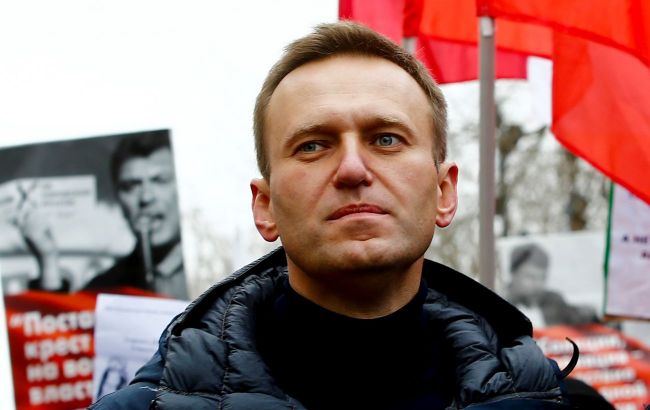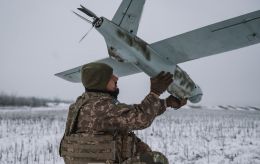'Crimea not a sandwich' and Ukraine within 1991 borders: Evolution of Navalny's stance on Russia-Ukraine war
 Alexei Navalny (Getty Images)
Alexei Navalny (Getty Images)
Today, Russian opposition figure Alexei Navalny died in prison. The cause of death is under investigation, with some reports suggesting a detached thrombus. Since 2014, he has made controversial statements about the Russia-Ukraine war, but he deemed the full-scale invasion of Ukraine unjust and aggressive.
For Navalny's remarks on the war, check out the RBC-Ukraine compilation.
Statements on Crimea: Not a "sandwich" and a promise of a "fair referendum"
Following the annexation of Crimea, the opposition figure regularly commented on events on the Ukrainian peninsula. He pondered on how to solve the Crimean issue but agreed that the seizure was unlawful.
In October 2014, Navalny gave an interview to the radio station Echo of Moscow, which caused a backlash. When asked about "Is Crimea ours?" (referring to a popular propaganda slogan), he replied that the peninsula was seized with "blatant violation of all international norms, but now it is part of Russia." He also advised Ukrainians not to deceive themselves.
"Crimea will remain part of Russia and will never become part of Ukraine in the near future," he said.
Navalny also assured that he wouldn't return the peninsula to Ukraine if he became the Russian president.
"Is Crimea like a sandwich with sausage that you can flip back and forth?" he added.
His words puzzled supporters and other opposition figures, with some becoming disillusioned with Navalny. In 2015, he termed the annexation of Crimea harmful, noting the importance of adhering to the Budapest Memorandum, which guaranteed Ukraine's territorial integrity. Now Russia has found an enemy in the population of a 40-million country.
"I believe that strategically what has been done with Crimea, not to mention Ukraine, will cause great harm to Russia. But the problem of Crimea cannot be solved quickly. It cannot be solved sandwich-like. It cannot simply be returned," he added.
In July 2017, in an interview with Echo of Moscow, Alexei Navalny stated that if elected president of Russia, he would conduct a "fair referendum" within occupied Crimea and would attempt to involve Ukraine and the EU.
"Throughout my life, I haven't seen any territorial conflict resolved on planet Earth. None. Well, with very rare exceptions," he said.
Two years later, Navalny again called the annexation of Crimea illegal and stated that Russia had gone so far that there would be no simple solution.
"There are two million people with Russian passports there. So, it's already some kind of incomprehensible mix. You can't reverse this mix," he said, reiterating the idea of a "referendum."
"Russia must immediately withdraw its troops from Donbas"
In 2015, Navalny referred to the war in Donbas as a different order of events.
"It's no longer some political mistake, it's a crime against the Russian Federation and against the Russian people, a crime of an international nature. This war must be stopped. We need to stop sponsoring this regime (the militants - ed). Without Russia's sponsorship, financial, organizational, hiding these people - it will all collapse fairly quickly," he said.
He also suggested taking "some painful steps," including allowing pro-Russian terrorists to leave for Russian territory.
"But I believe that what Russia needs to do is immediately withdraw all troops, cease all special operations, and stop the sponsorship. Indeed, not just ritually, as Lavrov and Putin do, stating that all of this is part of Ukraine, it all needs to stop as soon as possible. This all drags us into an abyss. And it brings happiness to no one," Navalny added.
He continued to voice the direct Russian involvement in the Donbas war in 2017.
"Undoubtedly, our troops are there. Undoubtedly, there are armed groups directly supported by Russia, as acknowledged by the leaders of these unrecognized republics," he said in an interview with Ksenia Sobchak.
He also promised to implement the Minsk agreements if he became the President of Russia. In his opinion, this was the recipe for resolution.
"To resolve the problem of Donbas, we need to do what your familiar acquaintance - Putin - signed, start with implementing the Minsk agreements. I will implement the Minsk agreements. The world demands it from us, Ukraine demands it from us... I will fulfill the Russian part of the Minsk agreements, hand over control of the border," Navalny said.
Drawing parallels with Crimea, he added that this issue supposedly was not related to Donbas.
"I know that my words are not liked by many in Ukraine, my words are not liked by many in Russia, but I speak as it is. Realistically, we see that in the near future, of course, Crimea will not be recognized by anyone, but it will remain a part of the Russian Federation in practice," he added.
End of delusions in prison: How Navalny condemned the war and advocated for the return of Ukrainian territories
After poisoning, treatment in Germany, and return to Russia, the opposition leader was imprisoned in a fraud case. The Russian authorities accused him of embezzling donations, while Navalny called the persecution political. On February 24, 2022, during the trial, he made a statement about Russia's full-scale invasion of Ukraine.
"Please note in the protocol my appeal to the court and the world: I am against this war," he said, placing responsibility on Vladimir Putin.
In March, a post appeared on his Instagram calling for Russians to take to the streets to stop the war.
"We - Russia - want to be a nation of peace. Unfortunately, few will call us like that now. But let's not become a nation of scared silent people. Cowards who pretend not to notice the aggressive war against Ukraine unleashed by our clearly mad tsar. I cannot, do not want to, and will not be silent while pseudo-historical delusions about events of a hundred years ago become a reason for Russians to kill Ukrainians, and those defending themselves kill Russians," the post read.
In May 2022, he was sentenced to 9 years in prison. He turned his final words in court into an anti-war speech.
"No one has killed more Russians in recent years than Putin. Don't like it when I talk about war? I will use war as a metaphor for your trials - they are also built on lies. On TV, in every report, they said they wouldn't send troops to Ukraine… You may break many fates, but you will suffer a historical defeat here and in this stupid war you started... There is no goal, no sense in it. A person lives in Kharkiv - for example, a judge. One day, on February 24, she's called a Nazi, and a missile kills her child. And she doesn't know how to go on living," he addressed his judges.
Almost a year ago, on February 20, 2023, Navalny published the principles of his political platform, part of which was dedicated to the war. He acknowledged that Russia was guilty of killing tens of thousands of Ukrainians and committing war crimes.
"What borders in Ukraine? The same as in Russia - internationally recognized, defined in 1991. We, Russia, recognized them then too. Russia must recognize these borders now. There's nothing to discuss here. Almost all borders in the world are arbitrary and cause dissatisfaction for someone. But there cannot be any fighting to change them in the 21st century. Otherwise, the world will plunge into chaos," the statement read.
Navalny thus backed off "sandwich rhetoric" and acknowledged that Crimea must be returned to Ukraine.
"To leave Ukraine in peace and allow it to develop as its people wish. To stop the aggression, end the war, and withdraw all Russian troops from Ukrainian territory. Continuing the war is precisely the hysteria of impotence while ending it is a strong move," he said.
Navalny also suggested seeking ways to compensate for damages after a change of power in Russia and the end of the war, together with Ukraine, the U.S., the EU, and the UK. For example, by redirecting revenue from oil and gas exports to compensation. In his manifesto, he also advocated for dismantling Putin's regime and his dictatorship.

